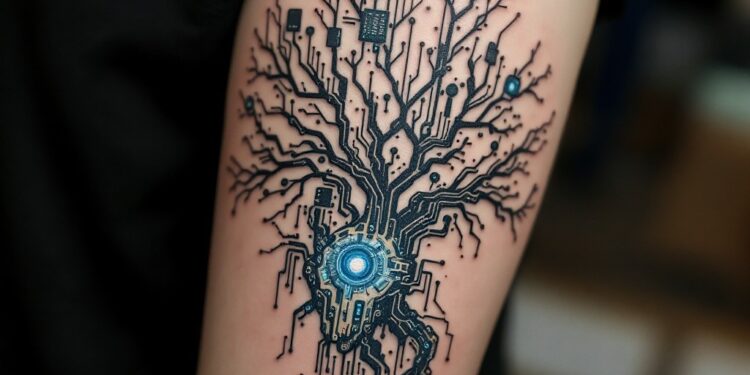
Tattoo artistry has seen remarkable changes over the centuries, evolving from traditional techniques rooted in ancient cultures to the integration of cutting-edge technology like artificial intelligence (AI). Traditional methods, such as hand-poking or using basic tools, have been practiced for generations and are often deeply tied to cultural heritage and symbolism.
The arrival of AI has introduced a transformative phase in the tattoo industry. By using advanced algorithms, AI can generate intricate, customized designs based on individual preferences. This technological shift has expanded creative possibilities for tattoo artists, enabling them to explore new dimensions of design and precision. While AI presents exciting opportunities, it also brings challenges that must be addressed as the industry moves forward.
The Role of AI in Modern Tattoo Art
AI is reshaping the tattoo industry by introducing innovative tools and methods for creating unique designs. Through machine learning algorithms, neural networks, and access to vast datasets, AI systems assist artists in generating custom tattoo designs with unparalleled efficiency and accuracy.
Unlike traditional approaches, AI can process extensive libraries of art styles, tattoo designs, and user inputs in seconds, offering a wide range of tailored options. This technology enhances the creative process by providing artists with inspiration and precision, ultimately improving the overall client experience.
How AI Tattoo Artists Operate
AI tattoo systems work by analyzing vast databases of existing tattoos, art styles, and user preferences to produce personalized designs. These systems rely on advanced algorithms to understand client requirements and generate bespoke concepts that align with their tastes.
One of the key strengths of AI in tattoo artistry is its ability to deliver highly detailed and precise designs. By automating certain aspects of the design process, AI reduces the likelihood of errors, allowing artists to focus on refining and executing the final tattoo. This combination of human skill and AI-generated precision opens up new possibilities for creating intricate and unique tattoos.
Challenges and Limitations of AI in Tattoo Art
While AI offers significant advantages, it also introduces challenges and limitations that must be carefully considered.
Creativity and Emotional Depth
One major limitation of AI in tattoo artistry is its lack of creative intuition and emotional connection. Human tattoo artists draw inspiration from personal experiences, cultural influences, and individual styles, resulting in art that carries emotional resonance and meaning. In contrast, AI-generated designs are based on patterns and data, which can sometimes make them feel impersonal or lacking in depth.
Ethical Concerns
The rise of AI in tattooing also raises ethical questions. One concern is the potential displacement of traditional tattoo artists, as AI systems become increasingly capable of performing tasks traditionally handled by humans. Additionally, questions about the ownership and originality of AI-generated designs remain unresolved. Since these designs are created by combining elements from existing art, it is unclear who holds the rights to the final product.
Transparency is another ethical issue. Clients must be fully informed about the role AI plays in the design process, ensuring they are aware of how their tattoos are created.
Integration of AI in Tattoo Studios
The integration of AI into tattoo studios offers numerous benefits, blending traditional artistry with modern technology. AI-powered tools, such as design generators and tattoo machines, provide artists with innovative resources to create highly personalized and intricate designs.
By adopting AI, tattoo studios can enhance their services, offering clients a unique combination of traditional craftsmanship and advanced design capabilities. This fusion of human creativity and AI precision represents a significant evolution in the tattoo industry, pushing the boundaries of what is possible in tattoo artistry.
The Future of AI in Tattoo Artistry
The introduction of AI into the tattoo industry is set to reshape how tattoos are designed and perceived. From streamlining design processes to enabling new creative possibilities, AI has the potential to revolutionize the craft.
However, the industry must strike a balance between embracing technological advancements and preserving the unique qualities that human tattoo artists bring to their work. By addressing challenges such as creativity, ethics, and originality, the tattoo community can ensure that AI serves as a tool to enhance, rather than replace, the artistry and emotional depth of tattooing.
As the fusion of AI and traditional techniques continues to evolve, tattoo artists and studios have the opportunity to explore uncharted creative territories, redefining the future of tattoo artistry.
The post The Evolution of Tattoo Artistry appeared first on New York Tech Media.
© 2025 Benzinga.com. Benzinga does not provide investment advice. All rights reserved.
Trade confidently with insights and alerts from analyst ratings, free reports and breaking news that affects the stocks you care about.